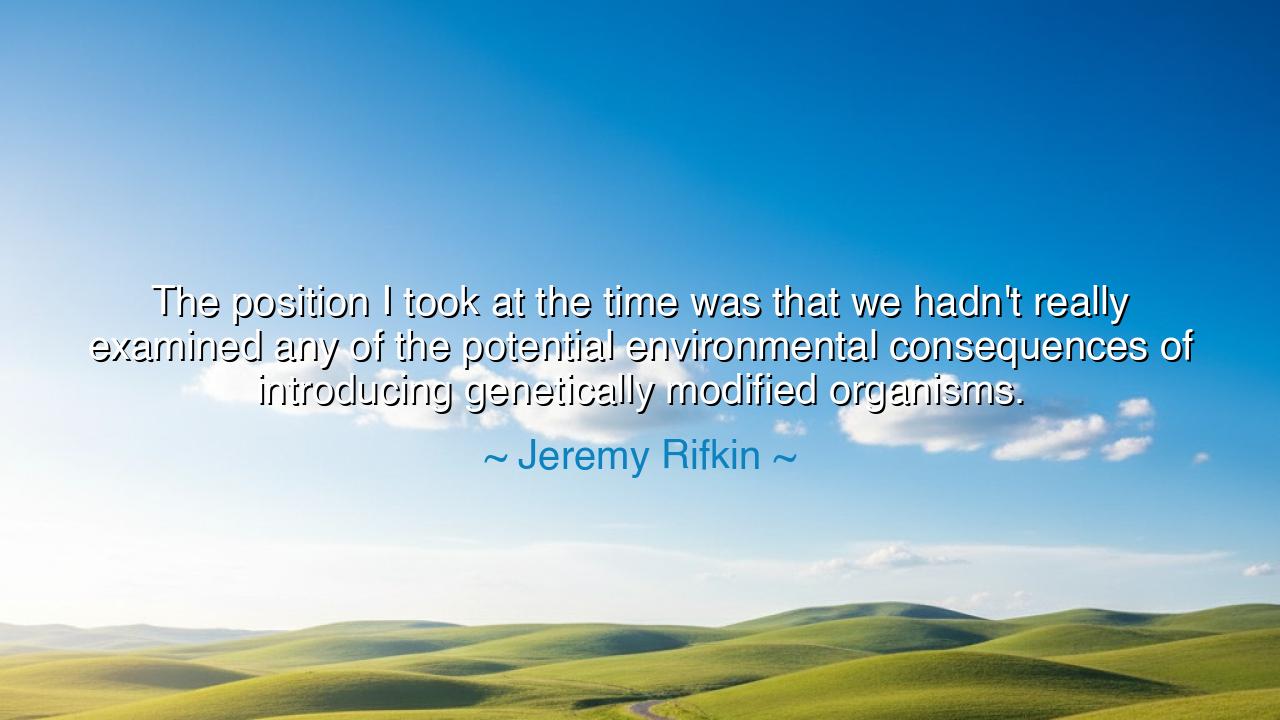
The position I took at the time was that we hadn't really
The position I took at the time was that we hadn't really examined any of the potential environmental consequences of introducing genetically modified organisms.






The words of Jeremy Rifkin, “The position I took at the time was that we hadn't really examined any of the potential environmental consequences of introducing genetically modified organisms,” strike like the voice of a watchman calling from the tower before the storm has arrived. They are words not of rejection for science, but of caution for mankind’s haste. Rifkin speaks of a moment when human ingenuity, dazzled by its own creations, rushed forward without pausing to weigh the cost. He reminds us that every gift of knowledge carries with it a shadow, and that to ignore the shadow is to invite disaster.
The origin of this saying lies in the debates of the late twentieth century, when the first genetically modified organisms (GMOs) were being introduced into agriculture. Scientists and corporations hailed them as miracles—crops resistant to pests, plants that promised greater yields, seeds that could withstand droughts. But Rifkin, a social thinker and activist, urged humanity to slow its march. He argued that the environmental consequences had not been studied deeply enough, that the balance of ecosystems could be disrupted by human meddling in the very code of life. His words arose not from blind fear, but from the wisdom that haste in matters of nature often leads to unforeseen calamities.
History gives us a mirror of this truth in the tale of the cane toad in Australia. In the 1930s, farmers introduced these creatures to control beetles that were harming their sugarcane. But the toads, instead of solving the problem, became a plague themselves—poisonous, invasive, spreading across the land, killing native species, and upsetting the fragile balance of nature. What was meant as a solution became a curse. Rifkin’s warning about GMOs echoes this same lesson: interventions, however well-intentioned, can spiral beyond control if the consequences are not thoroughly considered.
The deeper meaning of Rifkin’s words is not merely about GMOs, but about the very spirit of human progress. Science without foresight becomes arrogance; invention without reflection becomes danger. Humanity, in its hunger to dominate nature, risks forgetting that it is bound to nature’s laws. The seeds of tomorrow are not only sown in the soil but in the choices we make today. Rifkin’s wisdom is that before planting new forms of life, we must first plant humility, patience, and reverence for the interconnected web of creation.
Yet there is also hope in his statement. To examine consequences is not to forbid progress, but to make it safer, wiser, and more enduring. The call is not to abandon science, but to wed it with conscience. For what good is abundance if it poisons the rivers? What good is yield if it destroys the soil? What good is invention if it leaves future generations with the burden of collapse? Rifkin’s position reminds us that the true measure of innovation is not its speed, but its harmony with the earth.
The lesson for us is clear and urgent. Before embracing any technology that touches the foundations of life, we must ask: what are its effects upon the air, the water, the soil, the creatures, and the generations yet to come? We must demand transparency from corporations, responsibility from governments, and humility from scientists. And in our own lives, we must cultivate awareness, choosing food, energy, and practices that honor the earth rather than exploit it blindly.
Therefore, let us live as caretakers, not conquerors. Let us support progress, but only when it walks hand in hand with wisdom. Let us teach our children that knowledge is power, but power without responsibility is ruin. For in this lies the survival of both humanity and the earth itself.
So let Rifkin’s words endure across the ages: “We hadn't really examined any of the potential environmental consequences…” May they remind us that the first step of wisdom is not in the making of fire, but in asking whether the fire will burn or warm. And may they inspire us to build a future where science is tempered with caution, invention with foresight, and progress with reverence for the fragile world that sustains us all.






AAdministratorAdministrator
Welcome, honored guests. Please leave a comment, we will respond soon